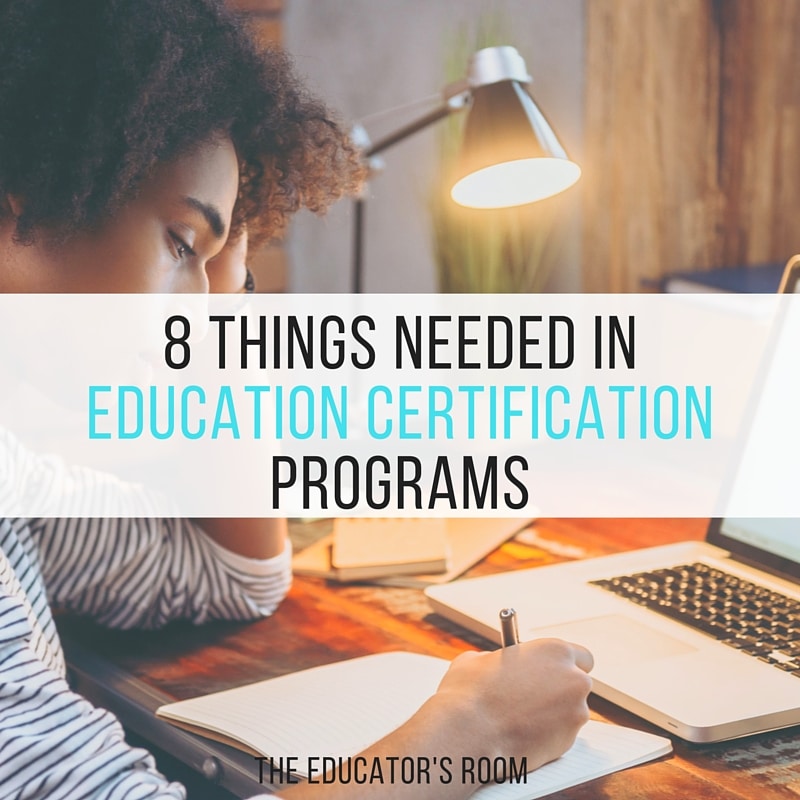As a classroom teacher, I have had at least ten student teachers and dozens of practicum students from seven or eight universities. I have also unofficially mentored many first-year teachers by having an open door to help solve problems and answer questions. Because of this, I can say without any hesitation that not all teacher education programs are equal. Certainly, they all met the state criterion for teaching programs but the “how to” varied tremendously. I’m not sure they have to be identical, but some do a decidedly better job at teacher preparation than others. Add to this mix, alternative programs, such as Teach for America, and the abilities of teachers entering the classroom runs the gamut in readiness to educate our children and manage a classroom.
After working with all those young women and men, I have observed inconsistencies that need to be remedied to build our profession with strong, intelligent teachers. Here are things I think need to be part of all education programs.
1. Education programs should only accept students who apply to the program. They shouldn’t be stuck there by an advisor because they are “undecided” on a major. I am so surprised that this is still standard operating procedure by many colleges. We need to get rid of the philosophy of “Well, you could always teach.” Teaching is a profession and a calling. An education degree is more than job training.
2. Teachers need to be trained in education philosophies and theories, child development, management strategies, as well as the newest teaching techniques. Also, strategies for working with English Language Learners, and learning and behavior issues need to be taught. I had a young woman doing her second practicum who hadn’t been taught about differentiation. She did a great job with the kids but was lacking in the basics to do the best job possible.
[fusion_builder_container hundred_percent=”yes” overflow=”visible”][fusion_builder_row][fusion_builder_column type=”1_1″ background_position=”left top” background_color=”” border_size=”” border_color=”” border_style=”solid” spacing=”yes” background_image=”” background_repeat=”no-repeat” padding=”” margin_top=”0px” margin_bottom=”0px” class=”” id=”” animation_type=”” animation_speed=”0.3″ animation_direction=”left” hide_on_mobile=”no” center_content=”no” min_height=”none”][bctt tweet=”I had a young woman doing her second practicum who hadn’t been taught about differentiation.” username=”EducatorsRoom”]
3. Lesson planning seemed so ridiculous when I was in my education program because it seemed so scripted, yet it is so necessary. Granted no actual teacher writes all that stuff down but we do it in our heads. Education students need to learn to think through what will happen during a lesson and what to do next. The flow and timing are hard enough to learn but without the practice of writing each step of an entire plan, it is nearly impossible.
4. Classroom experience needs to be as broad and varied as possible. I have had student teachers whose main kid exposure has been playing with their nieces and nephew at family parties. This is unfair to everyone, the children in the class, the supervising teacher, and especially the student teacher. Ideally, some classroom experience, such as tutoring or teacher aiding, should be required early in the education program. Then, a longer practicum requiring full school days a couple times a week, or daily, focusing on one subject area. Also, differing age groups and types of schools should be included. In my teacher training, we were expected to divide our practicums and student teaching between urban, suburban, and private schools.
5. Advisors need to talk to their students and know them before they are assigned to classroom any student teaching or practicum experience. There should be face-to-face meetings. I’ve had several experiences with lack of communication between the advisor and student. The most dramatic example was the student teacher who contacted me the week before she was due to start saying she had given birth a few days earlier and wondered if she could start a week late. What? We tried to do the student teaching but it simply was impossible as she didn’t have the time or energy needed. If her advisor had met with her in person she would have “seen” this was not going work.
6. Programs need to decide what to do with mediocrity. Some potential teachers are not skilled enough while others need more support. There is one program I worked with that only allowed the supervising teacher to give the grades “A”, “B”, or “F.” This forced me to fail a mediocre practicum student. There was no way I could give her a “B”, she was not there at all. She would have been a “C-.” She could have been coached and have gotten ready to be in a classroom. Instead, I was forced to fail her. Six years later, it still bugs me.
7. A student of education needs to learn to reflect on what went on while they taught or even observed. I don’t know any teachers who journal their reflection on lessons daily but we reflect on our teaching every minute of the day. The practice of reflection while training to be a teacher helps develop that skill.
8. Professionalism needs to be instilled in pre-service teachers. We need to be able to discuss what we do in our classroom with a wide range of people. We have to be able to advocate for our students. To be taken seriously, teachers need to be as professional as possible. I don’t mean wearing a suit every day. I mean being timely, using correct grammar, being respectful to everyone, and looking neat and clean. Oh, and don’t show up reeking of alcohol. My rule of thumb was you should always be ready with a smile, and dressed well enough that if the evil mom gives you the once over, she has nothing to be critical of.
[bctt tweet=”It takes a serious educator with a variety of experiences to be ready to enter the teaching profession.” username=”EducatorsRoom”]
I could teach my student teachers to laugh, to relax, and when to take a stand but only if they were ready to be in front of the classroom. It takes a serious educator with a variety of experiences to be ready to enter the teaching profession. This is just a quick list, and I am certain I missed many things education students need to learn to become great teachers.
I have a huge concern about programs that push or rush people into the classroom. How can they even be a beginning expert in the challenging, but fulfilling, career in education?

[/fusion_builder_column][/fusion_builder_row][/fusion_builder_container]





Leave a comment